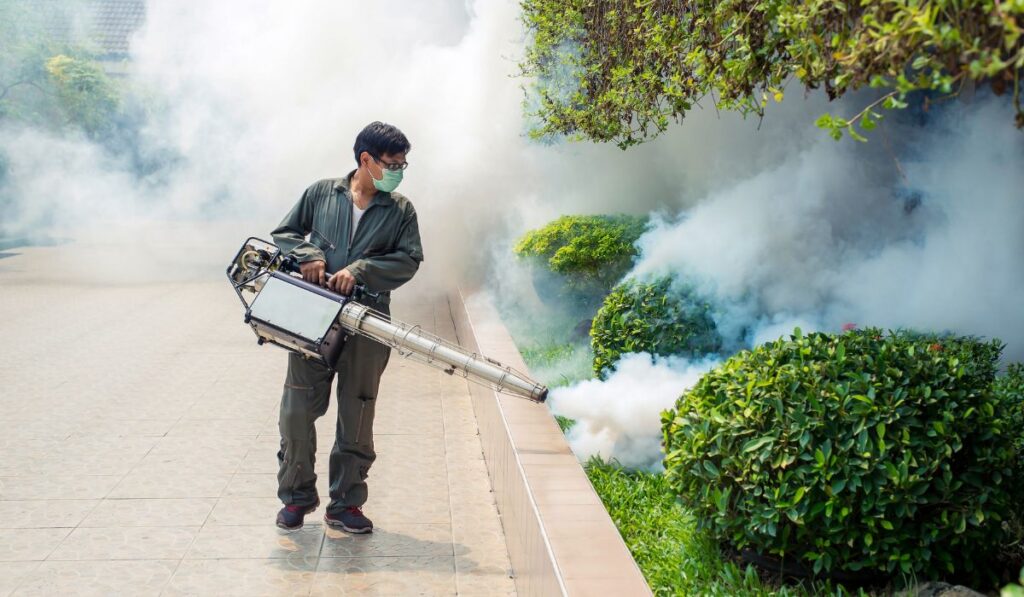Warm weather brings sunshine, barbecues, and evenings spent outdoors—but it also brings mosquitoes. While it’s natural to want to reclaim your backyard from these annoying pests, it’s equally important to protect beneficial insects like bees. Bees play a vital role in pollination and maintaining a balanced ecosystem, and unfortunately, many traditional mosquito control methods can be harmful to them.
Thankfully, with the right approach, you can enjoy a mosquito-free yard without putting pollinators at risk. In this article, we’ll explore practical and effective bee-friendly mosquito control tips, including natural and organic solutions that are safe for your garden and the environment.
Why Traditional Mosquito Control Harms Bees
Conventional mosquito sprays often contain harmful chemicals such as pyrethroids and neonicotinoids. These substances not only kill mosquitoes but also impact beneficial insects—including bees and butterflies. Even minimal exposure can disorient bees, interfere with their ability to pollinate, or result in fatal contamination of the hive.
That’s why it’s crucial to adopt mosquito control safe for bees. The key is to balance mosquito prevention with eco-conscious practices that maintain pollinator health.
1. Eliminate Standing Water
The simplest and most natural way to reduce mosquito populations is to eliminate their breeding grounds. Mosquitoes lay eggs in stagnant water, and removing these water sources is an essential step in any eco-friendly mosquito solution.
Tips:
-
Empty birdbaths, kiddie pools, and pet bowls regularly.
-
Clean gutters and remove yard debris that holds moisture.
-
Use mosquito dunks with Bacillus thuringiensis israelensis (Bti)—a bacterium that kills mosquito larvae but is safe for bees.
2. Choose Bee-Safe Repellents and Sprays
If you need to spray, look for the best bee-safe mosquito control products made with natural ingredients like essential oils. Some oils—such as citronella, lemongrass, eucalyptus, and lavender—repel mosquitoes but don’t harm bees when used correctly.
Recommendations:
-
Apply sprays in the early morning or late evening when bees are less active.
-
Avoid spraying flowers, blooming plants, or areas near bee hives.
-
Use non-aerosol, oil-based repellents that evaporate slowly and stay localized.
Always check product labels to ensure they’re marked as bee-friendly mosquito control.
3. Introduce Natural Mosquito Predators
A biodiverse garden not only looks beautiful but also helps control pests naturally. Birds, bats, dragonflies, and certain fish are all natural predators of mosquitoes and don’t interfere with bee populations.
Ideas to Try:
-
Install birdhouses and bat boxes to encourage these mosquito-eating allies.
-
Create a dragonfly pond with plants like sedges or water lilies.
-
Add mosquito fish (Gambusia) to ornamental ponds—these fish consume larvae without disrupting bees.
This is a cornerstone of natural mosquito control service philosophy: let nature restore balance.
4. Plant Bee-Friendly, Mosquito-Repellent Flora
Certain plants are known to deter mosquitoes while simultaneously attracting pollinators. Adding these to your landscape creates a dual-purpose garden: pest-free and pollinator-rich.
Bee-Safe Mosquito-Repellent Plants:
-
Basil: Repels mosquitoes; bees love its tiny flowers.
-
Lavender: Both repellent and highly attractive to bees.
-
Catnip: Contains nepetalactone, a powerful mosquito deterrent.
-
Marigolds: Emit a scent that repels mosquitoes but doesn’t bother bees.
Incorporating these plants offers a chemical-free, organic mosquito yard treatment that enhances your yard’s beauty and biodiversity.
5. Use Professional Natural Mosquito Control Services
For homeowners dealing with severe mosquito infestations, hiring a natural mosquito control service is an excellent option. Many companies now offer environmentally responsible treatments that specifically advertise as bee-friendly mosquito control solutions.
What to Look For:
-
Use of organic, botanical-based sprays.
-
Targeted application techniques that avoid bee habitats.
-
Technicians trained in pollinator-safe practices.
Ask potential providers about their safety certifications and request a treatment schedule that minimizes bee exposure (e.g., treatments done after sunset).
6. Try DIY Organic Mosquito Yard Treatments
You can also create your own organic mosquito yard treatment using ingredients from your kitchen or local natural store. Here’s a simple recipe:
DIY Mosquito Spray:
-
1 cup water
-
1 cup witch hazel
-
10 drops each of citronella, eucalyptus, and lavender essential oils
Mix in a spray bottle and apply to outdoor furniture, patios, and shaded corners—areas where mosquitoes typically congregate. Avoid spraying flowers or bee-friendly plants.
7. Maintain a Healthy Lawn and Garden
Overgrown grass, dense shrubbery, and piled leaves create cool, moist hiding spots for mosquitoes. Regular lawn care isn’t just for looks—it’s a natural form of pest control.
Best Practices:
-
Mow regularly and trim overgrown hedges.
-
Remove piles of leaves, wood, or mulch.
-
Aerate the soil to prevent standing puddles.
Combining this with eco-friendly mosquito solutions like compost tea or neem oil enhances your garden’s health while keeping pests in check.
8. Avoid Broad-Spectrum Pesticides
Many homeowners unknowingly use broad-spectrum insecticides that wipe out not only mosquitoes but also bees, ladybugs, and butterflies. These products can have long-term environmental consequences and should be avoided.
Instead, choose the best bee-safe mosquito control products that are:
-
Labeled “pollinator safe”
-
OMRI-certified for organic gardening
-
Designed for targeted pest elimination
Conclusion: A Balanced Approach to Pest Control
A mosquito-free backyard doesn’t have to come at the expense of nature’s most valuable pollinators. With a bit of planning and the right tools, bee-friendly mosquito control is both possible and practical. Whether you’re using natural mosquito control services, trying a DIY organic mosquito yard treatment, or simply planting more lavender and basil, you’re contributing to a healthier, safer environment for your family—and for bees.
Remember, every action counts. By choosing eco-friendly mosquito solutions and promoting mosquito control safe for bees, you’re not just protecting your yard—you’re protecting the planet.
- Essential Bee-Safe Backyard Mosquito Tips Every Homeowner Should Know
- Discover eco-friendly mosquito control tips that protect your backyard and keep bees safe. A must-read for every homeowner!
- #pestcontrol
Related posts:
 Explore 7 benefits of kids Brazilian Jiu Jitsu for beginners
Explore 7 benefits of kids Brazilian Jiu Jitsu for beginners
 Seasonal Pet Grooming Tips for Dogs & Cats in West Palm Beach, FL
Seasonal Pet Grooming Tips for Dogs & Cats in West Palm Beach, FL
 Preventing Septic System Failure: The Role of Timely Repair, Cleaning, and Service
Preventing Septic System Failure: The Role of Timely Repair, Cleaning, and Service
 Eco-Friendly and Tamper-Proof: The Rise of ROUND CR TIN-B in Sustainable Packaging
Eco-Friendly and Tamper-Proof: The Rise of ROUND CR TIN-B in Sustainable Packaging
 How Can Non-Alcoholic Drinks Boost Your Health and Mood: Step-By-Step Guide
How Can Non-Alcoholic Drinks Boost Your Health and Mood: Step-By-Step Guide
 Creating Inspired Learning Spaces with Montessori and Waldorf Furniture
Creating Inspired Learning Spaces with Montessori and Waldorf Furniture
 Find Your Lucky Digits with Mobile Number Numerology Calculator
Find Your Lucky Digits with Mobile Number Numerology Calculator
 Mole Astrology – What Your Moles Reveal About Your Destiny to You
Mole Astrology – What Your Moles Reveal About Your Destiny to You








